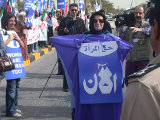Kuwaiti Vote Bolsters Women
By Dominic Moran for ISN
The recent Kuwaiti election saw a significant break with previous voting patterns that are unlikely to provide the basis for political stability in the absence of further reinforcing reforms.
The poll saw a historic moment for the women’s rights movement in Kuwait and the wider Gulf region, with the election of four women candidates to the National Assembly.
Their victories - and those of over a dozen independent candidates - likely indicate the partial success of electoral district reforms designed to lessen the impact of tribal voting patterns.
This, and a slight drop in support for opposition Islamic movements appears to signal greater acceptance of the role of women in political life amid profound popular disillusionment with the established pattern of election, crisis and collapse that has undercut governance in recent years.
The stage appears set for an intensification of kulturkampf clashes in parliament over the presence in the legislature and wider societal role of women. Calls have already been heard from Islamic representatives for women members to be forced to wear the veil in the house while the Islamic Salafi Alliance slammed voting for women as a sin during campaigning.
The balance of power between the disparate opposition groups and government supporters in the Assembly appeared to shift slightly but not in a manner likely to prevent further clashes.
An important test of the government-parliamentary relationship will come with the upcoming external pagetablingcall_made of an economic stimulus package attacked by the opposition as favoring the wealthy business elite.
In the absence of parties (officially banned), the make-up of the Kuwaiti parliament can be difficult to ascertain. According to one reading of the results, liberals increased their representation in the election by one to six MPs; Sunni Islamic movements returned 11 members; with Shia stable on nine. Tribal candidates and independents won the remainder of the 50 seats.
The Islamic Salafi Alliance fared poorly, winning only two seats - down from four. The diminution of the Alliance representation is important as its previous success was widely interpreted as a marker in the rise of Salafi tendencies vis-à-vis Muslim Brotherhood offshoots across the region – a trend that if demonstrated could signal greater radicalization.
Despite the equally poor electoral performance of the Kuwaiti Brotherhood offshoot, the Islamic Constitutional Movement (HADAS), it appears that this reading of the situation was overly simplistic and that a new focus on local factors is required.
In comments carried by the Kuwait Times, Kuwait University’s Sajid Al-Abdali external pagenotedcall_made that the Salafis lost support, in part, through a fatwa deeming the cancellation of citizens’ loans unconstitutional.
The fragmentation of the wider opposition and constituent movement's inability to present coherent policy agendas also contributed to their limited political cachet.
The practice of opposition grilling of government members, known as interpellation, has been a feature of the reformed Kuwaiti parliamentary system and its repeated crises. Its overuse appears to have been a factor in the poor performance of Islamic parties.
There appears a danger that the election results could bolster conservative tendencies within the ruling al-Sabah family - which will maintain its hold on key cabinet portfolios - strengthening antagonism towards the further diminution of palace and government prerogatives.
Ultimately, while the success of women candidates is heartening, it is important not to overestimate its impact on the Kuwaiti democratic experiment which, while substantive, remains partial and ultimately untenable in its current form.

